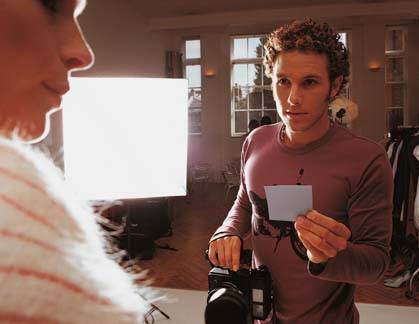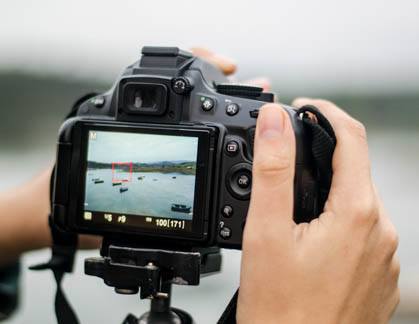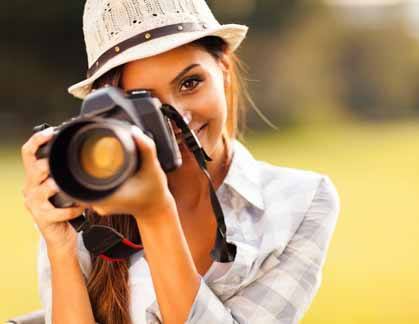Photography
School and Career Guide
Find information about photography schools and careers to help you get started.

Overview
Explore our photography articles in this guide to get a good idea of what photography school is like and how to get your photography career off to the right start.
What Is a Photography Job Like?
A photography job can take many different forms. Some photographers freelance, others run their own studios or work for companies as salaried employees. Photographers can also further customize their careers by choosing to specialize in a certain kind of photography. From wedding photography to commercial photography to photojournalism, the possibilities are almost endless.
Top Reasons to Attend Photography Schools
There isn't a shortcut to a successful photography career. It takes hard work, perseverance and, of course, talent. You need to be committed to learning the craft of photography. This can be a continual process as technology grows and changes. In the competitive photography job market, every bit of hard-won knowledge and techniques can help you get your foot in the door.
Do you really need to go to photography school to get adequate schooling? The answer to that question depends on your career goals and your learning style.
Photographer Skills and Personality Traits
Take a look at some of the innate traits and skills you'll need to work as a photographer:
| YOU ARE… | YOU SHOULD HAVE… |
|---|---|
| Artistic | Originality |
| Computer savvy | Schedule flexibility |
| Creative | Business skills |
| Detail oriented | Communication skills |
| Good with people | Marketing skills |
| Independent | Technology skills |
| Organized | Visual skills |

Degrees
How far should you take your education in photography?
From portraits to photojournalism, the field of photography encompasses a wide variety of careers. If you're thinking about getting an education for photography, you'll first want to consider what your goals are. There are some entry-level positions for those with technical knowledge and a "good eye," but in the grander scheme, a master's of photography is useful to professionals and aspiring teachers alike.
Associate-Level Education for Photography
There are many photography jobs available whose primary prerequisite is technical knowledge—particularly in freelance photography, portrait photography or as a photographic assistant. In these cases, a certificate or diploma program may be sufficient.
However, some may choose to pursue a 2-year associate's degree in order to acquire basic knowledge of the business and creative aspects of the field. Design and composition fundamentals are usually taught in an associate's degree program, and you can also pick up courses in basic business skills.
Bachelor's Degrees in Photography
A bachelor's-level education for photography will give you more time to develop your portfolio, which is a critical part of being competitive in the job market. In addition, bachelor's degree programs often provide a more varied curriculum and the opportunity to specialize. For instance, you might choose to emphasize business skills if your goal is to open a private studio; alternatively, if you plan to work in online media, specializing in digital photography can help. A 4-year degree also enables you to pursue a masters of photography in the future.
Some of the classes you'll take may revolve around the following:
- Commercial photography
- Digital photography
- Portraiture
- Black and white photography
- Color imaging
- Medium format and large format photography
Courses within these topics may teach you these skills:
- Combining conceptual elements with technical elements
- Arranging and understanding composition
- Using digital editing technology
- Setting up lighting
- Putting together a photography portfolio
- Using software and technology like Photoshop
- Understanding terminology
- Using different cameras, films and equipment
Master's of Photography
If you're planning to go all the way in your education for photography, you'll want to think about getting a master's of photography—either an MA (Master of Arts) or an MFA (Master of Fine Arts). A master's of photography allows you to teach photography at the college level and increases your earning potential to boot. It also confers a bit more prestige to your résumé, telling potential employers that you have discipline and persistence as well as an advanced level of knowledge in the photography field.
Those who go on to earn a master's might select a career in the following areas:
- Academia, as a photography professor
- Commercial and industrial
- News and photojournalism
- Scientific research and study

Online vs Campus
Learn what you can expect from an online photography program.
Why an Online Photography Degree?
People drawn to photography love to express their creativity visually. Whether you're a hobbyist or already working as a professional photographer, earning a degree online can give you a competitive edge in a field where many are self-taught.
Most photography and photo editing is digital and done exclusively on computers, so it's not a stretch to convert traditional, on-campus degree programs to an online format. You won't be missing out on much by studying online. Plus you'll also have more flexibility and can often work at your own pace with no time limits for completing your degree.
If you're considering an online degree, make sure the photography program is accredited. This, too, will give you a competitive edge.
What Degrees Are Available Online?
Whatever your level of interest, there are many opportunities to learn about photography online. If you just want to take a few courses, non-degree classes are available. But if you want to go more in depth, professional certificates, associate's and bachelor's degrees can be earned online. Though rare even in traditional schools, online graduate degrees in photography are an option.
Can I Take My Entire Program Online?
Yes! However, if you're leaning toward online studies, you may want to consider a hybrid program that offers both on- and off-campus classes. Because photography is such a hands-on job, some techniques may be better learned in person.
In addition, online programs tend to focus more on digital photography and editing and less on darkroom processing. And if you're interested in a certain niche, such as fashion photography, you may want to attend a traditional school.
Will My Courses Be the Same as in a Classroom Degree Program?
Online programs are designed to provide the same comprehensive, quality education as brick-and-mortar schools. New classes are being added and updated continually. However, as mentioned, if you're interested in darkroom processing, you may want to take an in-person class.
What Will You Study Online?
In an online photography program, you'll be spending a lot more time in the "digital darkroom" rather than a film darkroom. The art of visual expression and the fundamentals of color and composition will still be an integral part of the curriculum, as well as photography basics like lighting and photo history. Some of the typical courses offered in online photography programs include:
- History of Photography
- Color Theory/Color Management
- Lighting
- Digital Photography Basics
- Advanced Photoshop
- Digital Printing
- Business of Photography
- Photojournalism
- Portraiture/People Photography
- Commercial Photography
You can expect to invest a fair amount of money on photography equipment in any photography program, online or in person. Online degree programs will specify the appropriate digital camera equipment, computer hardware, software and lighting items needed to complete the coursework.

Salary
Find out what you might earn once you become a photographer.
Factors That Influence Salary
A number of factors affect earning potential. These are the most common variables:
- Will you live in a large city or a smaller town? Cost of living is a factor when you live in a city as opposed to rural locations.
- How much work experience will you have? As you gain experience and build a client base (if you're self-employed), you may be able to charge more for your services. Or if you take a salaried position at a company, you may command a higher paycheck from your employer.
- Will you have a photography degree? Whereas this is a career in which you can do without a degree, having those credentials can make you more hirable in a variety of fields.
- Will you be working full time? Especially if you're self-employed, you can set your own hours. However, the number of hours you work will directly affect your photography salary.
- What kind of photography will you do? Different kinds of work command different photography salaries.
Photographer Salaries
There are many paths you can take in professional photography. The median annual salary for photographers, according to the U.S. Bureau of Labor Statistics 2023 data is $40,760. But as noted, your salary may be impacted by where you live. The BLS reports median salaries for the highest paying metropolitan areas in the U.S.:
| Metro Area | Median Annual Salary |
|---|---|
| Los Angeles-Long Beach-Anaheim, CA | $101,450 |
| San Francisco-Oakland-Hayward, CA | $88,250 |
| New York-Newark-Jersey City, NY-NJ-PA | $65,630 |
| Salinas, CA | $59,370 |
| New Orleans-Metairie, LA | $55,920 |
| Bridgeport-Stamford-Norwalk, CT | $55,890 |
| San Jose-Sunnyvale-Santa Clara, CA | $55,120 |
| Washington-Arlington-Alexandria, DC-VA-MD-WV | $54,410 |
| New Haven, CT | $53,820 |
| Minneapolis-St. Paul-Bloomington, MN-WI | $53,550 |
Source: U.S. Bureau of Labor Statistics 2023 Occupational Employment Statistics
Start Earning a Professional Photography Salary
Ready to start a career as a professional photographer? Getting training is a good first step. Find photography schools in our directory, and prepare for a future in the photography world.

About the Job
A photography job can take many different forms, but one thing is certain—the job is about much more than just taking pictures.
Some photographers freelance, others run their own studios or work for companies as salaried employees. Photographers can also specialize in a certain kind of photography, further customizing their careers to fit their particular interests. From wedding photography to commercial photography to photojournalism, the possibilities are almost endless.
Job Responsibilities
While there may not really be a "typical" day in a photography job, photographers often find themselves performing the following kinds of tasks:
- Marketing and networking through social media and professional organizations
- Communicating with clients to understand their needs
- Preparing for photo shoots (e.g. scouting locations, scheduling, renting equipment such as lighting)
- Selecting cameras, lenses and photographic equipment
- Setting up or taking down lighting, backgrounds, props and other equipment
- Photographing images
- Post-processing images using software programs such as Photoshop and Lightroom
- Creating final print images or digital files
- Archiving images
- Maintaining and updating a digital portfolio and website
- Staying abreast of technological advances and trends in the equipment and industry
- Performing administrative tasks such as billing
Skills Needed in a Photography Job
- Vision – Everyone has seen a picture of common subjects, such as a field of flowers or the moon. So photographers need to find creative ways to make their images stand out. Clients will hire you for your personal perspective, your unique style and your ability to use those things to communicate their message. Your creativity and style can set you apart from the competition in this field.
- Communication – Client relationships are very important in a photography career, especially for those who run their own business or freelance, so good communication skills are essential. You'll need to work with clients to make sure you understand what they want and need.
- Technical Skills – Photography jobs have always required a certain level of technical skill in order to operate photography equipment to the best effect. Since digital photography technology is now the standard for commercial, editorial and recreational photographers, technical skill are essential.
- Business Skills – Whether you freelance or have your own photography business, you'll need to be able to run the administrative end of the business. You'll need to handle things like pricing, accounts payable and receivable, and marketing.
Categories
Photography Degree & Career Guide
- A Pro Talks About His Photography Training
- Digital Photography: The New Standard
- Fashion Photography Schools and Jobs
- Five Photography Careers That Pay the Bills
- Get in Focus at Photography School
- Outlook for Photography Jobs
- Photography School and Career Guide
- Six Reasons to Attend Photography School
- Specialize Your Photography Training and Career
- Tips for Starting a Photography Business
- Top Five Photography Portfolio Tips
- What to Ask Before Deciding on a Photography School
You may also like

Fashion Photography Schools and Jobs

Digital Photography: The New Standard

